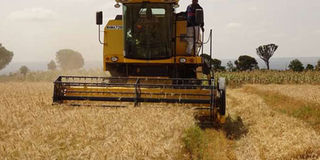Pay delay angers wheat producers

A combine harvester harvests wheat at Ilmashariani on July 21, 2016. Wheat farmers are complaining of delayed payment. PHOTO | GEORGE SAYAGIE | NATION MEDIA GROUP
What you need to know:
- The growers Thursday feared losing over Sh1.2 billion due to market instability and post-harvest damage by pests.
- The millers have secured a deal with the National Cereals and Produce Board to buy wheat from farmers at Sh3,000 per 90-kilogramme bag.
Wheat farmers in the North Rift region are unhappy with delayed payment by millers for their produce due to a surplus of the cereal that resulted in market instability.
The growers Thursday feared losing over Sh1.2 billion due to market instability and post-harvest damage by pests.
This followed a bumper harvest of the cereal this season.
“The delayed payment by millers is adding misery to farmers who have to repay loans they took to invest in the crop, and plan for the next planting season,” said Mr Silas Tiren, the Moiben MP and member of the National Assembly Committee on Agriculture.
The millers have secured a deal with the National Cereals and Produce Board to buy wheat from farmers at Sh3,000 per 90-kilogramme bag.
Mr David Sang, a farmer from Sergoit, Uasin Gishu County, said: “It is risky to invest heavily in wheat production considering unpredictable climatic conditions and the market price.”
According to Dr Johnston Irungu, the director of crops in the Agriculture ministry, the delay in the payment is due to oversupply of the produce to the board stores, where it is kept on behalf of millers in wheat growing regions.
“At the moment, the rate of wheat deliveries is much higher than what the millers can pay at a go,” said Dr Irungu.
Rift Valley produced 4.5 million bags of wheat from 127,825 hectares that was under the crop in the last season.
The country produces 350,000 tonnes against consumption of 1.08 million tonnes, prompting the country to import to plug the deficit.
“We agreed with millers and the Ministry of Agriculture that farmers should be paid for their produce on delivery and that the agreement should be honoured to the letter,” said Mr Tiren.
The fears of market instability for the local produce were confirmed by Cereal Growers Association chairman Farnie Kruger, who attributes the problems facing the sub-sector to the importation of cheap wheat from countries where production is subsidised.






